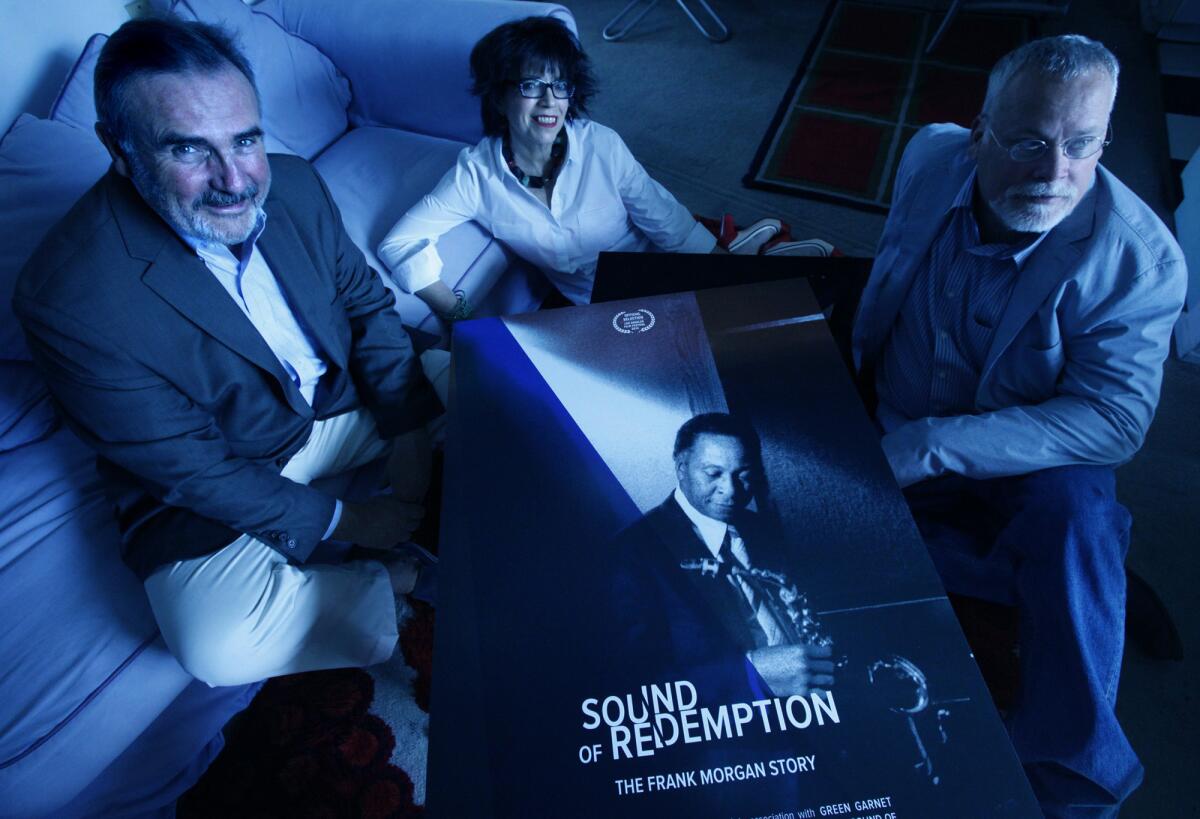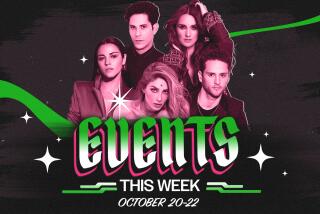‘The Frank Morgan Story’ sounds like a fine fit at L.A. Film Festival

- Share via
Frank Morgan was a legendary jazz saxophonist, recording 20 albums and crafting a unique sound that attracted the likes of Charlie Parker and Duke Ellington. But perhaps what’s most remarkable is that Morgan accomplished all this while spending 30 years of his life in San Quentin prison.
Morgan used his time behind bars to perfect his playing, assemble an all-star orchestra, and preach to others not to make the same mistakes that he did.
Morgan’s story of music and redemption inspired two filmmakers and a prominent author to tell his story on screen. The documentary “Sound of Redemption: The Frank Morgan Story” premieres Saturday as part of the Los Angeles Film Festival.
It was directed by N.C. Heikin, who worked with producer James Egan on the 2009 film “Kimjongilia.” They were both approached by Michael Connelly, whose L.A.-based mysteries are perennial bestsellers. Heikin met Connelly through her husband, who translates the writer’s books into French.
“When somebody like that says that there is a good story, then you better listen,” said Egan.
The film, which does not yet have a distributor, will be screened again at the festival on Monday.
Connelly, who incorporates jazz into the stories of his famous fictional character Harry Bosch, met Morgan at an educational music event in 2007 at the Berklee College of Music in Boston, not long before Morgan’s death at age 73. He heard Morgan preach to young musicians not to make the same mistakes that he made and then overheard him practicing at night at the hotel where they were both staying.
“One of the things that I wanted to do was to see if I could get that message somehow to go on even though he did not,” Connelly said in a recent interview in Los Angeles. “It’s a very simple message: ‘Don’t go the route I took.’ If we showed his route and what came afterwards, I think that it would have a powerful resonance with whoever watched and listened to it.”
The film takes viewers through the progression of Morgan’s career, from being brought up in a musically inclined family (his father, Stanley, was a member of the famous pop vocal group the Ink Spots), to their move to Los Angeles and Morgan’s prominent place in the local jazz scene, accompanying artists such as Billie Holiday.
The movie chronicles Morgan’s personal and legal problems, including interviews with friends, family and fellow musicians, and his path to redemption. Morgan struggled with drug addiction, and was jailed for crimes including bank robbery and check fraud between 1955 and ’85. During that span, Morgan spent more time in prison than he did outside, and fell back into addiction each time he was released.
After Connelly introduced Morgan’s music to Heikin, the filmmaker was instantly drawn to the saxophonist’s story.
“What thematically draws me is if I feel like there is something in my heart that I can relate to. If it hits me in my heart, then I know I can do something,” said Heikin, whose film “Kimjongilia” documented North Korean refugees. “It’s just in the music that this is a deep soul playing this music and speaking to all of us.”
Part of the film takes place at San Quentin during a tribute concert there. A number of musicians played for the inmates including Morgan’s protégé, saxophonist Grace Kelly. According to Egan, the performance had a visible effect on those in attendance.
“Many of the prisoners said that it changed their life,” said Egan, whose Wild at Heart Films produced the movie. “A lot of the musicians who went there were moved.... It was a very powerful experience and I think that many of the people in that room were transformed.”
Connelly and the filmmakers believe it’s appropriate that the documentary is screening at the Los Angeles Film Festival because of Morgan’s strong ties to the city. Morgan moved here in 1948 and later played at the illustrious jazz clubs along Central Avenue, both solo and as part of the famed Club Alabam band.
Connelly, who is conducting the festival conversation “Love Letters to Los Angeles” on Monday, said Morgan’s story fits into the city’s creative fabric.
“His story jumps out of the genre and goes across all endeavors because it gets into the ideas of where creativity comes from, how you keep it, and how you make it better,” Connelly noted. “It’s not just a message movie for jazz musicians.”
------------
‘The Sound of Redemption: The Frank Morgan Story’
When: 6:50 p.m. Saturday (sold out), and 4:50 p.m. Monday
Tickets: $11
Where: Regal Cinemas 9 & 10; Regal Cinemas L.A. Live Stadium 14; 1000 W. Olympic Blvd., Los Angeles
A Frank Morgan Tribute Concert
When: 2 p.m. Sunday
Tickets: $20
Where: The Grammy Museum, 800 W. Olympic Blvd., Los Angeles
A Festival Conversation: ‘Love Letters to Los Angeles: Michael Connelly’
When: 8 p.m. Monday
Tickets: $20
Where: Regal Cinemas 11; Regal Cinemas L.A. Live Stadium 14; 1000 W. Olympic Blvd., Los Angeles
Info: (866) FILMFEST (866) 345-6337 or https://www.lafilmfest.com
More to Read
Only good movies
Get the Indie Focus newsletter, Mark Olsen's weekly guide to the world of cinema.
You may occasionally receive promotional content from the Los Angeles Times.










